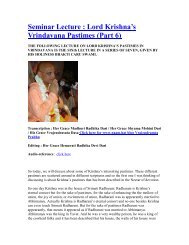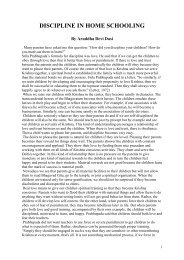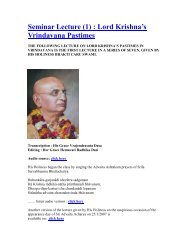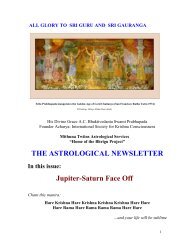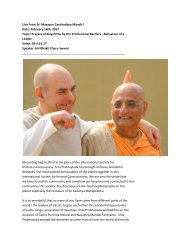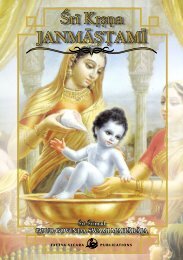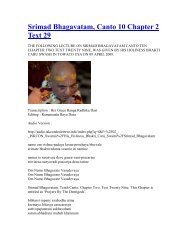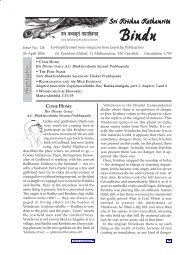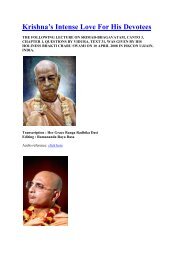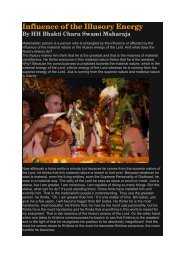Ramanujacharya â Biography - ebooks - ISKCON desire tree
Ramanujacharya â Biography - ebooks - ISKCON desire tree
Ramanujacharya â Biography - ebooks - ISKCON desire tree
You also want an ePaper? Increase the reach of your titles
YUMPU automatically turns print PDFs into web optimized ePapers that Google loves.
Ramanuja. Despite some minor philosophical differences, itis plain that the themes of devotion and surrender to God,which are essential to Ramanuja's teachings, are based to alarge extent on the writings of the Alvars.In terms of philosophy also Ramanuja was undoubtedlyinfluenced by the teachings of previous Vaisnava acaryas,most notably Yamunacarya and Bodhayana, the commentator onthe Vedanta sutras. In many ways the major achievement ofRamanuja as an acarya was to establish a solid philosophicalbasis for the devotional sentiments that had been expressedin the hymns of the Alvars. In order to do this it was firstessential that he refute the impersonalist teachings ofSankara's advaita-vada and large sections of hisphilosophical writings are dedicated to this task. To combatthe teachings of the nondevotional monists, Ramanujaattacked them on their own ground, rarely expressingdevotional sentiment and for the most part citing theUpanisads and Vedanta-sutras as scriptural evidence, ratherthan the overtly Vaisnava sastras. It is for this reasonthat Ramanuja, unlike Madhva, does not use the Srimad-Bhagavatam to support his teachings. The main philosophicalworks of Ramanuja are his commentary on Vedanta-sutra (SriBhasya), the Vedartha-samgraha, the Vedanta-sara and hiscommentary on the Bhagavad-gita.Three hundred years before Ramanuja, Sankaracarya hadattempted to establish his doctrine of absolute oneness, aconcept bearing many similarities to the Buddhistphilosophy. According to Sankara, nothing exists anywhereexcept Brahman, which is formless, changeless, eternal, anddevoid of all attributes. Therefore the variety that weperceive in this world is simply an illusion and does not inreality have any existence. Because the living being iscovered by ignorance (avidya or maya) he perceives varietyand changes; but when enlightened by pure knowledge, he willrealize that everything is in fact Brahman and that hisprevious perceptions were simply illusion. Obviously, insuch a philosophy devotion is also ultimately meaninglessbecause the distinction between God and His devotee is alsoillusory.In his commentary on Vedanta-sutra, Ramanuja stronglyattacks Sankara's ideas. He states that the concept ofBrahman as being indeterminate, without qualities orchanges, is meaningless. Any reality that cannot beperceived, known, thought of, or even spoken about is simplyfiction. The cosmic manifestation with all of its varietiesmay be temporary, but that does not mean it is unreal.Illusion is to perceive something as different from its realnature and not, as Sankara states, to perceive somethingthat does not in fact exist. When one mistakes a shell forsilver, both the silver and the shell are real, but theillusion is mistaking one thing for the other. Therefore theuniverse is real, but the illusion is to accept it as the6



